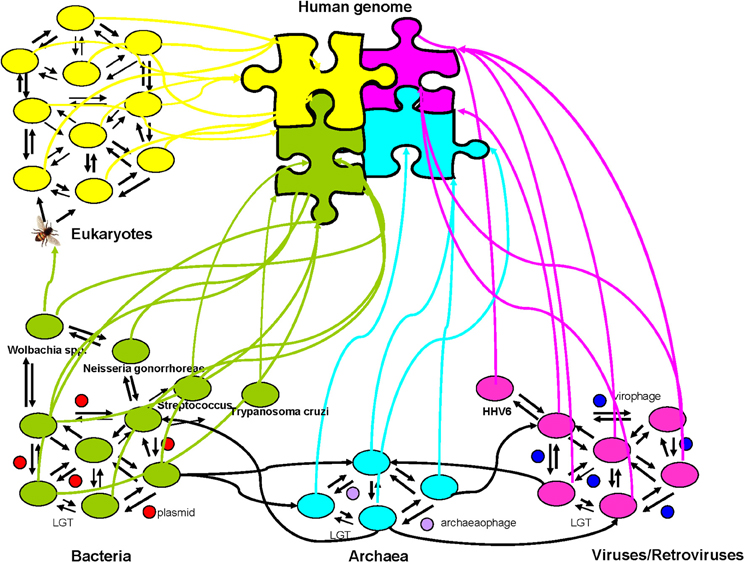Microbial genomics challenge Darwin
Collection of 14 papers. Editors Didier Raoult, Eugene V. Koonin.
Front. Cell. Infect. Microbiol. 2012.
Editorial: Microbial genomics challenge Darwin
Didier Raoult, and Eugene V. Koonin
http://journal.frontiersin.org/article/10.3389/fcimb.2012.00127/full
Different approaches:
- Raoult: radical upstaging of the Darwinian paradigm.
- Forterre and Gupta: conservative view.
- Koonin and Wolf: strives to balance the radical and the conservative approaches.
Evolution of microbes and viruses: a paradigm shift in evolutionary biology?
Eugene V. Koonin and Yuri I. Wolf
http://journal.frontiersin.org/article/10.3389/fcimb.2012.00119/full
“Recently, several genetic phenomena with a distinct Lamarckian flavor have been discovered (Koonin and Wolf, 2009a; O’Malley and Koonin, 2011). Probably, the most striking case is the system of adaptive antivirus immunity, known as CRISPR-Cas (Clustered Regularly Interspaced Palindromic Repeats and CRISPR-associated proteins), that is present in most archaea and many bacteria (Koonin and Makarova, 2009; van der Oost et al., 2009; Marraffini and Sontheimer, 2010; Makarova et al., 2011).”
Rhizome of life, catastrophes, sequence exchanges, gene creations, and giant viruses: how microbial genomics challenges Darwin
Vicky Merhej and Didier Raoult
http://journal.frontiersin.org/article/10.3389/fcimb.2012.00113/full
Gene flow and biological conflict systems in the origin and evolution of eukaryotes, L. Aravind, Vivek Anantharaman, Dapeng Zhang, Robson F. de Souza and Lakshminarayan M. Iyer
http://journal.frontiersin.org/article/10.3389/fcimb.2012.00089/full
“We develop the concept that biological conflict systems served as evolutionary “nurseries” for innovations in the protein world, which were delivered to eukaryotes via lateral gene flow to spur key evolutionary innovations all the way from nucleogenesis to lineage-specific adaptations.”
Lateral gene exchanges shape the genomes of amoeba-resisting microorganisms
Claire Bertelli and Gilbert Greub
http://journal.frontiersin.org/article/10.3389/fcimb.2012.00110/full
How microbiology helps define the rhizome of life
Kalliopi Georgiades and Didier Raoult
http://journal.frontiersin.org/article/10.3389/fcimb.2012.00060/full
“We wanted to confirm that the term “rhizome” in evolutionary biology applies to the entire cellular life history. This view of evolution should resemble a clump of roots representing the multiple origins of the repertoires of the genes of each species.”

The influence of rickettsiologists on post-modern microbiology
Kalliopi Georgiades, Vicky Merhej and Didier Raoult
http://journal.frontiersin.org/article/10.3389/fcimb.2011.00008/full
“Post-modern philosophy, also called the French theory (Wicks, 2003), states that the majority of theories, including scientific theories, are only based on meta-narratives expressing the influence of a culture at a given time.”
The genetic integrity of bacterial species: the core genome and the accessory genome, two different stories
Bo Segerman
http://journal.frontiersin.org/article/10.3389/fcimb.2012.00116/full
Lamarckian evolution of the giant Mimivirus in allopatric laboratory culture on amoebae
Philippe Colson and Didier Raoult
http://journal.frontiersin.org/article/10.3389/fcimb.2012.00091/full
The rhizome of life: what about metazoa?
Hemalatha G. Ramulu, Didier Raoult and Pierre Pontarotti
http://journal.frontiersin.org/article/10.3389/fcimb.2012.00050/full
“The relative amount of HGT [horizontal gene transfer] events detected in metazoa merely represent just tip of an iceberg. Currently, the reported rate of HGT in animal kingdom is relatively low and still in the state of infancy.”
Lateral gene transfers have polished animal genomes: lessons from nematodes
Etienne G. J. Danchin and Marie-Noëlle Rosso
http://journal.frontiersin.org/article/10.3389/fcimb.2012.00027/full
“In contrast, the contribution of LGT to the composition of animal genomes is less documented. In the light of recent analyses that reported series of LGT events in nematodes, we discuss the importance of this phenomenon in the evolutionary history and in the current composition of an animal genome.”
Protein based molecular markers provide reliable means to understand prokaryotic phylogeny and support Darwinian mode of evolution
Vaibhav Bhandari, Hafiz S. Naushad and Radhey S. Gupta
http://journal.frontiersin.org/article/10.3389/fcimb.2012.00098/full
“conserved signature indels (CSIs) and conserved signature proteins (CSPs)”
“In this review we have discussed the usefulness of CSIs and CSPs, as novel and important class of molecular markers for understanding the evolutionary relationships among prokaryotes. We have presented compelling evidence that based upon the species distribution patterns of these molecular signatures different prokaryotic taxa from phylum down to the genus levels can be clearly identified.”
Selfishness, warfare, and economics; or integration, cooperation, and biology
Emiliano Salvucci
http://journal.frontiersin.org/article/10.3389/fcimb.2012.00054/full
“Darwinism grew out of the Malthusian concepts and vision that disease and food shortages act as regulators of the population favoring the fittest in a continuous struggle for life.”
“In Bacteria, mutation rates are subject to complex regulation that we are now just beginning to understand (Wright, 2000).”
“An observer may notice a differential survival of different kinds of organisms that constitute a population (we can remember the dubious experiment of the peppered moth), but the observer cannot affirm that what led to this survival differential was a selection.”
“Natural selection is a linguistic trap. It has many definitions and nuances along the literature and just adds more confusion to the interpretations of facts. It appears that many biologists seem to be unaware that in their anti-creationism, they have replaced one dogma for another, the dogma of the all-powerful natural selection to which they cling with so much faith.”
Intelligibility in microbial complex systems: Wittgenstein and the score of life
Fernando Baquero and Andrés Moya
http://journal.frontiersin.org/article/10.3389/fcimb.2012.00088/full
“Life is a highly complex system, including the most complex objects in the known universe (Bedau, 1996).”
‘In the way of thinking of Ludwig Wittgenstein, and even more sharply in his friend and commenter, Moritz Schlick (Schlick, 1936), the meaning of the word “life” can only be shown, not understood and consequently not clearly expressed in propositions.’
Leibniz: “music is an unconscious exercise of metaphysics where the mind does not know what is thinking about.”
Darwin’s goldmine is still open: variation and selection run the world
Patrick Forterre
http://journal.frontiersin.org/article/10.3389/fcimb.2012.00106/full
“The scientific contribution of Darwin, still agonized in many religious circles, has now been recognized and celebrated by scientists from various disciplines.”
‘These critics either confuse “Darwinism” and old versions of “neo-Darwinism” or misunderstand the role of gene transfers in evolution.’
“Recently, Addy Pross proposed a general theory of evolution, extending Darwin’s theory to inanimate matter (Pross, 2011).”
“However, in recent years, whereas still being a devil for religious fanatics, Darwin became the target of heavy criticisms coming from part of the scientific community itself.”
‘This is a sensitive topic, considering the renewal of creationist thinking in fundamentalist religious circles and the wide publicity given to these “non-orthodox views.’